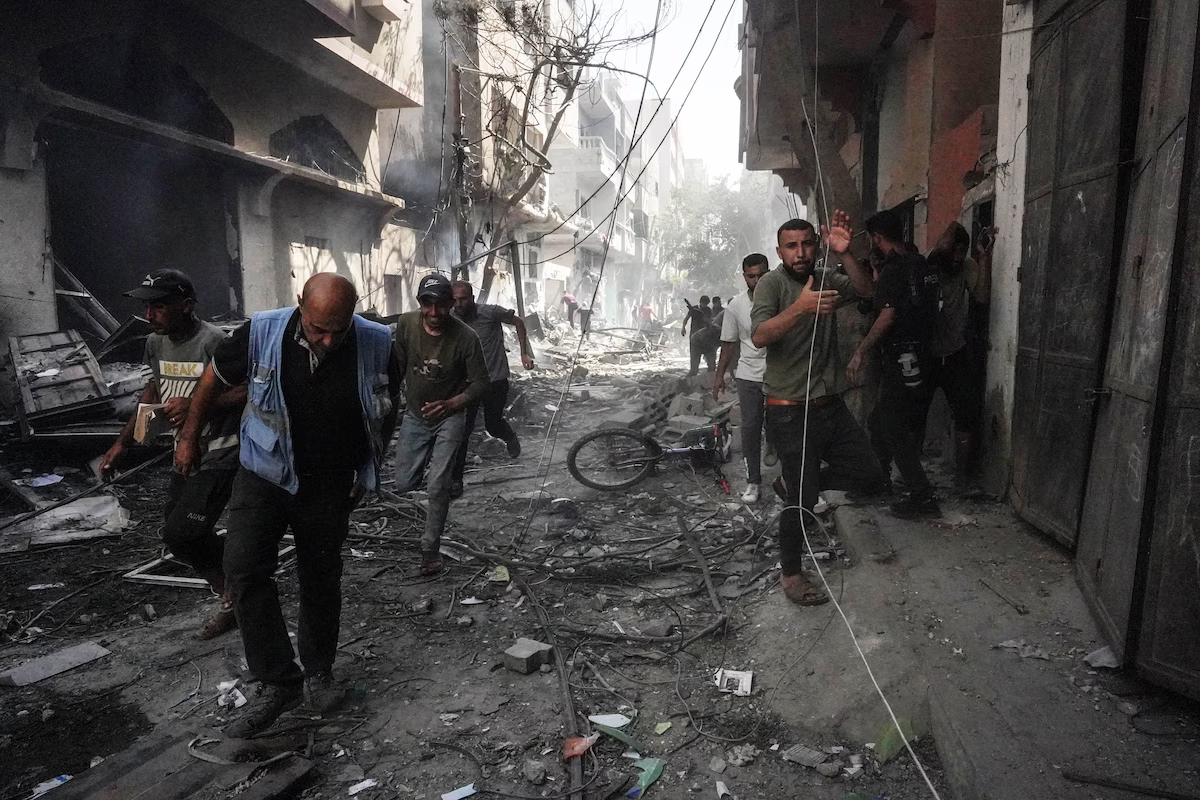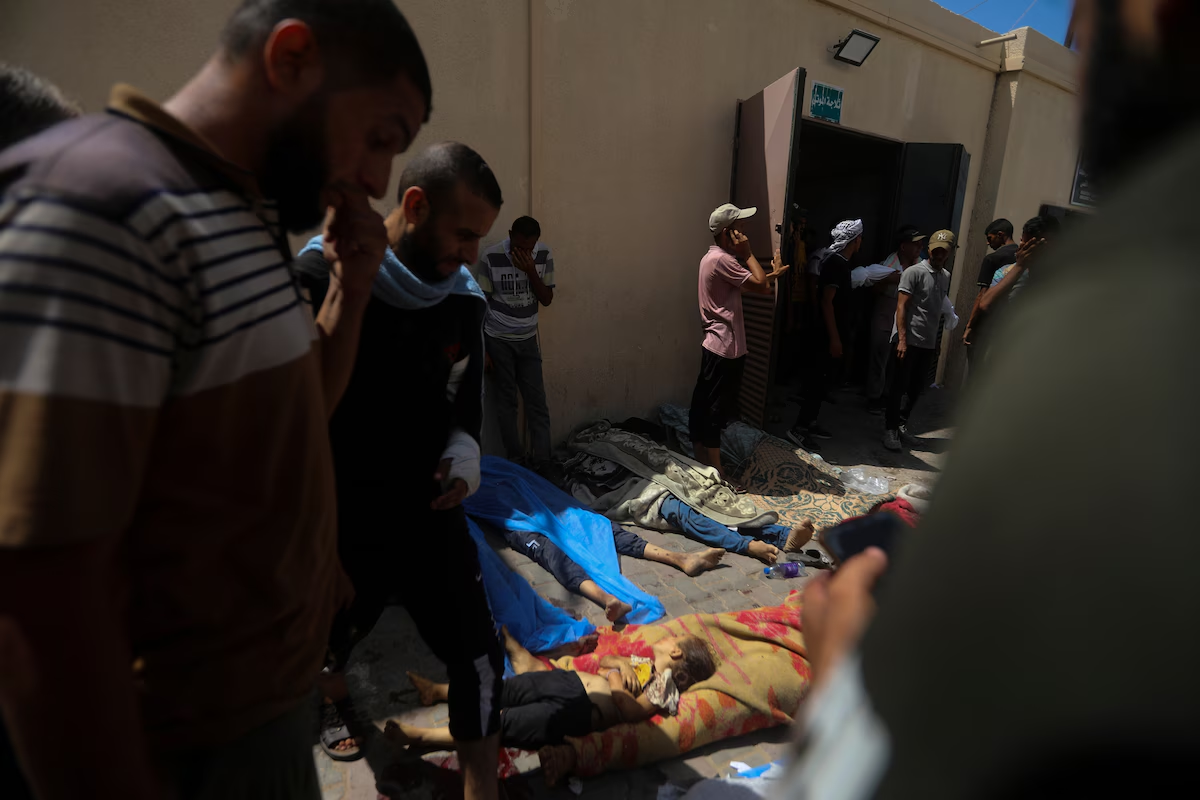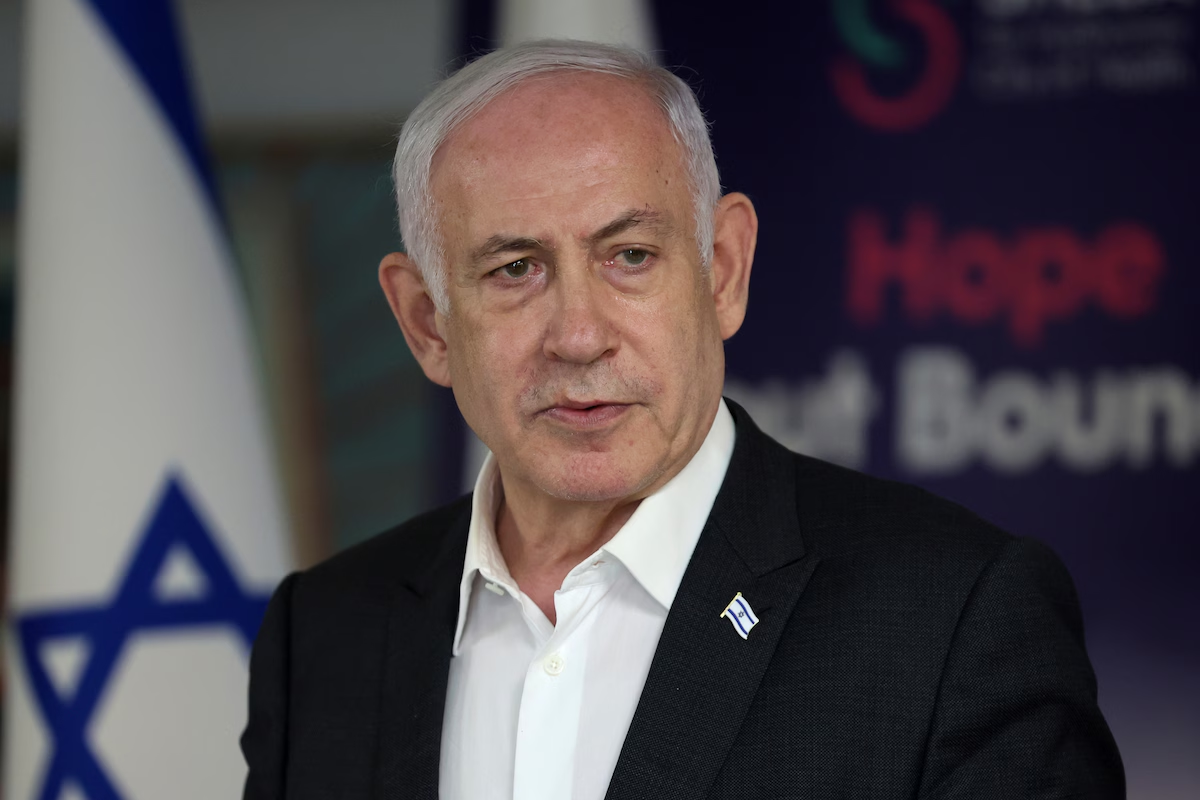The brazen daytime raid freed four Israeli hostages but unleashed relentless bombardment of the Nuseirat refugee camp in central Gaza.
By Claire Parker, Mohamad El Chamaa and Lior Soroka, The Washington Post, June 8, 2024

Israel’s military launched one of the bloodiest raids of the war Saturday, killing more than 200 Palestinians in a brazen operation to rescue four hostages from the central Gaza Strip.
Israeli forces recovered the hostages alive from two buildings in Nuseirat, an impoverished refugee camp. But the fiery assault, in the middle of the day, left unimaginable devastation in its wake.
Residential blocks were destroyed, tanks menaced the streets and grievously wounded Palestinians, some without limbs, writhed in pain on the dusty roads of the camp’s central market, according to videos and images of the raid. Many of them never reached local hospitals, health officials said. But even then, medical facilities decimated by the war often have little ability to treat injured patients.
“Israel committed a massacre in Nuseirat,” Khalil al-Degran, spokesman for al-Aqsa Martyrs Hospital in nearby Deir al-Balah, said at a news conference Saturday. “In this terrible state … the hospital cannot absorb the number of dead and injured. The hospital has been at full capacity for weeks.”
Degran and other health officials said 210 people had been killed and 400 others wounded in the blitz. The number of dead included 94 at al-Aqsa Martyrs Hospital and 116 at the nearby al-Awda Hospital, according to Degran and Marwan Abu Nasser, administrative director at al-Awda.
“During the operation, helicopters targeted anyone who moved in the courtyard of al-Awda,” said Rami al-Sharafi, a doctor at the hospital. The military, he said, had “prevented ambulances from leaving or returning to the hospital” while the raid was underway.

Israeli Defense Minister Yoav Gallant on Saturday praised the mission as “one of the most heroic and extraordinary operations I have witnessed over the course of 47 years serving in Israel’s defense establishment.”
The operation retrieved Almog Meir Jan, 22; Andrey Kozlov, 27; Shlomi Ziv, 41; and Noa Argamani, 26. The four hostages were abducted from a music festival in the Israeli desert on Oct. 7. Hamas fighters attacked southern Israel that day, killing around 1,200 people and kidnapping more than 250 others to bring back to Gaza as hostages.
Since then, Israel has embarked on a destructive military campaign to eliminate Hamas, which ruled Gaza for years. The military has laid waste to much of the enclave, including its infrastructure, and restricted the flow of food and aid, even as the population slides into famine.
In nine months of war, more than 36,800 people have been killed in Gaza, according to the Gaza Health Ministry, which does not distinguish between civilians and combatants but says the majority of those killed are women and children.
“We were terrified 100 times over because of the bombing. I pray God saves us,” said a displaced woman staying in Deir al-Balah, which is close to Nuseirat. She spoke on the condition of anonymity out of fear for her safety.
“These people are ready to burn the entire world to get someone they want,” she said.
The medical system in Gaza was already on life support, and the deluge of wounded people Saturday quickly overwhelmed the hospitals. A graphic video from al-Aqsa Martyrs Hospital, released by the Gaza Health Ministry, showed a crowded trauma bay, with bodies laid out on a bloody floor.
Degran said the hospital was functioning with only one generator and risked going out of service imminently. He appealed to nearby residents to donate blood to save the lives of those wounded in the attacks, and called on the international community “to intervene immediately and urgently to save the Aqsa hospital.”
But in Israel, military spokesman Rear Adm. Daniel Hagari said troops had prepared for weeks for the “high risk, complex mission,” which was “based on precise intelligence.”
It began at 11 a.m. local time, Hagari said. Israeli forces came under fire inside the two buildings where the hostages were held and as they departed Gaza. One member of Israel’s police counterterrorism unit, Chief Inspector Arnon Zmora, was seriously injured in the fight and later died of his wounds.
“This is what we do in Israel. We risk our lives to save the lives of our hostages,” Hagari said at a news conference. “While we are happy that our four hostages are home, we will not lose sight that 120 hostages are still being held by Hamas in Gaza — men, women, children.”
Share this articleNo subscription required to readShare
“We will not stop fighting for their freedom,” he added.

More than 100 hostages were freed through negotiated releases, the vast majority during a week-long truce in November. Talks to reach a longer-lasting cease-fire that would bring home the 120 hostages believed to remain in Gaza have floundered since then. About a third of those hostages have been confirmed dead.
Late last month, President Biden announced a three-stage truce proposal, which he said Israel supported, in an effort to prevent hawkish factions of the Israeli government from scuttling the talks. But significant daylight remains between Israel and Hamas over how and when the war will end.
At a press appearance in France, Biden said he welcomed the operation Saturday. “We won’t stop working until all the hostages come home and a cease-fire is reached,” he said. White House national security adviser Jake Sullivan also said the United States was still pushing for the cease-fire deal.
Hamas officials vowed Saturday that the raid would not force it to capitulate.
“Our people will not surrender, and the resistance will continue to defend our rights in the face of this criminal enemy,” Ismail Haniyeh, head of Hamas’s political bureau, said in a statement. “If the occupation believes that it can impose its choices on us by force, then it is delusional.”
Palestinian Authority President Mahmoud Abbas, a Hamas rival that governs parts of the occupied West Bank, requested an emergency session of the U.N. Security Council to discuss the operation, official media reported.

For Israeli Prime Minister Benjamin Netanyahu, the raid was a domestic political victory. He has come under intense pressure from hostage families and demonstrators in Israel to agree to a deal with Hamas. But his right-wing allies, who advocate for a continuation of the war without pause, have vowed to tank his government if he reaches an agreement.
Netanyahu has sought to downplay his role in crafting the latest cease-fire proposal. And on Saturday, opposition leader Benny Gantz, a member of Netanyahu’s war cabinet, postponed a speech he was meant to give, in which he was widely expected to resign from the government.
Gantz had given Netanyahu until June 8 to formalize a plan for postwar Gaza, a territory Israel occupied from 1967 to 2005.
Instead, he praised Israeli forces for a “complicated and brave operation that was carried out in an inspiring manner.”
“Even today, my heart goes out to all the families of the abductees,” he said in a statement. “We are committed to doing everything to bring them back home.”
News of the successful rescue mission Saturday sparked joy and drew plaudits across the country, as Israelis set aside the acrimony that has riven the country to celebrate a rare victory in the nine-month-old war.
Thousands of protesters have filled the streets of Tel Aviv on Saturday nights in weekly — and increasingly tense — displays of anger at Netanyahu’s government for prolonging the war and failing to bring home more hostages. Last Saturday, more than 100,000 Israelis turned out for the demonstration, demanding that Netanyahu accept Biden’s deal.
Merav Svirsky, the sister of Itay Svirsky, 38, an Israeli hostage who was declared dead in January, urged the Israeli government to reach a hostage-for-prisoners deal with Hamas.
“There have been seven hostages released in military operations so far. More than a hundred were released in the previous deal,” she said at a news conference Saturday. “It is possible to return all of them only through a deal. The only way to save lives and bring everyone back, is for Israel to commit to ending the war. Make a deal!”
Parker reported from Cairo; El-Chamaa from Beirut; Rubin and Soroka from Tel Aviv. Steve Hendrix in Jerusalem, Alon Rom and Shira Rubin in Tel Aviv, Hajar Harb in London, Bryan Pietsch in Washington, Cleve R. Wootson Jr. in Paris, and Hazem Balousha and Heba Farouk Mahfouz in Cairo contributed to this report.
Leave a Reply
You must be logged in to post a comment.